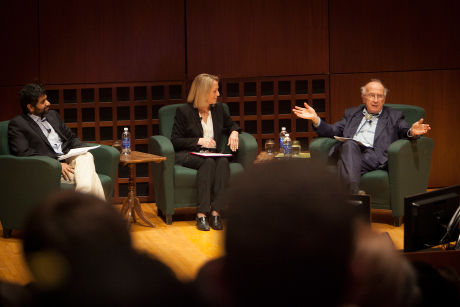Christian, atheist scientists tackle human nature
By Rose Linehan

The question of what makes us human has been a source of discussion and conflict for centuries. Although the question remains unanswered, a Christian geneticist and an atheist chemist found that their views on the topic were not so different in a Nov. 12 campus conversation – "Genes, Atoms or Something Else?" – attended by more than 500 undergraduates.
Praveen Sethupathy, a geneticist at the University of North Carolina, Chapel Hill, is a Christian. Nobel laureate Roald Hoffmann, Cornell’s Frank H.T. Rhodes Professor of Humane Letters Emeritus, is an atheist.
The discussion began with what scientifically makes a human a human: DNA. Although he is a geneticist, Sethupathy was quick to point out the limitations of examining DNA in the search for human identity.
“Our identities are influenced, but not fully determined … by our genetics,” Sethupathy said, explaining that the chemical “packaging” that surrounds DNA can be altered “by any number of lifestyle choices” like smoking and diet. Furthermore, these changes to the DNA “packaging” are in some cases hereditary.
Hoffmann agreed with Sethupathy’s assessment that genetic makeup is only a small part of human identity. “Even with E. coli we share a substantial amount [of genetic material]. … Does it free us of choices for good and for evil? No more than original sin prevents you from making a choice about being good or evil,” Hoffmann said.
Both agreed that our genetics are not responsible for providing us with moral standards, although they agreed that morality is an important aspect of humanity. The presenters did not, however, agree on the source of objective moral standards.
“I believe … that there are objective moral standards and that they do come from [God],” Sethupathy said, noting that he thought religious moral standards are sometimes imposed inappropriately.
Hoffmann said he believes that morality springs from human biology. “I think ethics arises out of natural, personal and societal interactions,” he said, noting that moral standards are very similar across cultures, despite different religious backgrounds.
The two scientists agreed that scientific thought is not sufficient to explain all human phenomena, and that even science is not based strictly on objective observation. “We joke around about how when we isolate RNA or a protein and we expect to see something at the bottom of the tube, and often we don’t, we walk by faith and not by sight,” Sethupathy said. Hoffmann described the “knowing without seeing” necessary to understand bonds between molecules.
Both agreed that there are human experiences that cannot be scientifically explained. “I think the closest that we come to a shared transcendence or a shared religious experience in our world is probably in listening to music,” Hoffmann said. Sethupathy said he feels closest to God when listening to music, be it Michael Jackson or smooth jazz.
“As a scientist I have a responsibility and a burning desire to respect and honor what science is and what it isn’t,” Sethupathy said.
The presenters urged students to explore both science and faith in developing their identities, and to continue the discussion of human nature with people of opposing views.
Rosemary Avery, chair of the Department of Policy Analysis and Management, moderated the discussion. It was presented by the Veritas Forum at Cornell and Chesterton House, a Christian studies center affiliated with Cornell United Religious Work.
Rose Linehan ’17 is a writer intern for the Cornell Chronicle.
Get Cornell news delivered right to your inbox.
Subscribe